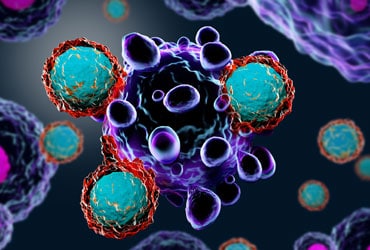Unbiased Identification of a CAR T Therapy Booster
In the midst of the excitement surrounding CAR T therapies, much needs to be done to optimize CAR T cell efficacy. Using a catalytically dead-guide RNA (dgRNA) library as a CRISPRa screening tool, the research team led by Sidi Chen, PhD, identified proline dehydrogenase 2 (PRODH2) as a novel booster of CAR T cell effector function (1). Overexpression or knockin of PRODH2 can reprogram T cell metabolism by promoting T cell proliferation, activation, and effector function resulting in enhanced antitumor efficacy in vivo.
Dr. Chen, an Associate Professor of Genetics, at Yale University, underscores the implications of their findings recently reported in Cell Metabolism: “I think the impact is two-fold. This study provides a novel system for unbiased identification of immune boosters and demonstrates PRODH2 as a new target to enhance therapeutic efficacy of T cell therapies such as CAR-Ts.”
To pinpoint possible stimulators of T-cell cytotoxic activity, Dr. Chen and his team devised and performed a genome-scale dgRNA library-based CD8+ T cell kill assay activation screen. Four top hits (Prodh2, Ccnb1ip1, Srek1ip1, and Wdr37) were validated and shown to enhance effector function. Given that PRODH2-overexpressing T cells were significantly more proliferative and more resistant to apoptosis than their vector-transduced counterparts, the authors explored the therapeutic potential of co-engineering PRODH2 with different CAR molecules. Coexpressing PRODH2 in BCMA-CAR T cells and CD22- CAR T cells increased CAR T treatment efficacy in vitro and in vivo in the appropriate cancer models.
The knockin of PRODH2 cocistronically with the CAR-T construct induced changes in cell cycle, metabolism, apoptosis, and immune response transcriptomic programs, including changes in genes involved in leukocyte-mediated cytotoxicity, inflammation, and T cell activation and effector function. Functionally, these PRODH2-gain-of-function CAR T cells responded more robustly in the presence of tumor cells – with significant increases in three effector cytokines (interferon gamma, granzyme B and TNF-alpha).

PRODH2 catalyzes the conversion of 4-hydroxyproline to 1-pyrroline-3-hydroxy-5-carboxylate (PHC). Metabolomic profiling confirmed that PRODH2 CD22-CAR T cells had reduced 4-hydroxyproline levels and increased PHC levels. Multiple biochemical experiments showed that the increased cytolytic activity of these PRODH2 CD22-CAR T cells was directly related to PRODH2’s role in proline metabolism. It has been previously shown that proline metabolism is upregulated in activated CD4 T cells (2). This current work provides additional evidence of the importance of the proline metabolic pathway in T cell function.
This research was supported, in part, by a 2017 AACR NextGen Grant for Transformative Cancer Research that was given to Dr. Chen. This grant mechanism was an initiative of 2014-2015 AACR President, Dr. Carlos L. Arteaga, to support talented young investigators engaged in research that challenges conventional wisdom. Fitting the bill, Dr. Chen’s research is focused on cancer systems biology — leveraging in vivo genome engineering approaches such as CRISPR-mediated cancer modeling and genetic screening to identify key regulators in cancer progression, tumor immunity, and therapeutic responses. Recognizing the research support from AACR and its impact on his career, he shares, “The AACR grant played an important role in the early stage of my independent faculty career — supporting my lab’s cancer research at a critical stage. We very much appreciate the support.”
References:
- Lam SZ, Guo J, Tang E, Zhang Y, Wang G, Dai X, et al. A genome-scale gain-of-function CRISPR screen in CD8 T cells identifies proline metabolism as a means to enhance CAR-T therapy. Cell Metabolism 2022; 34: 595-614.
- Geiger R, Rieckmann JC, Wolf 1T, Basso C, Feng Y, Fuhrer T, et al. L-Arginine Modulates T Cell Metabolism and Enhances Survival and Anti-tumor Activity. Cell 2016; 167: 829-842.e13.